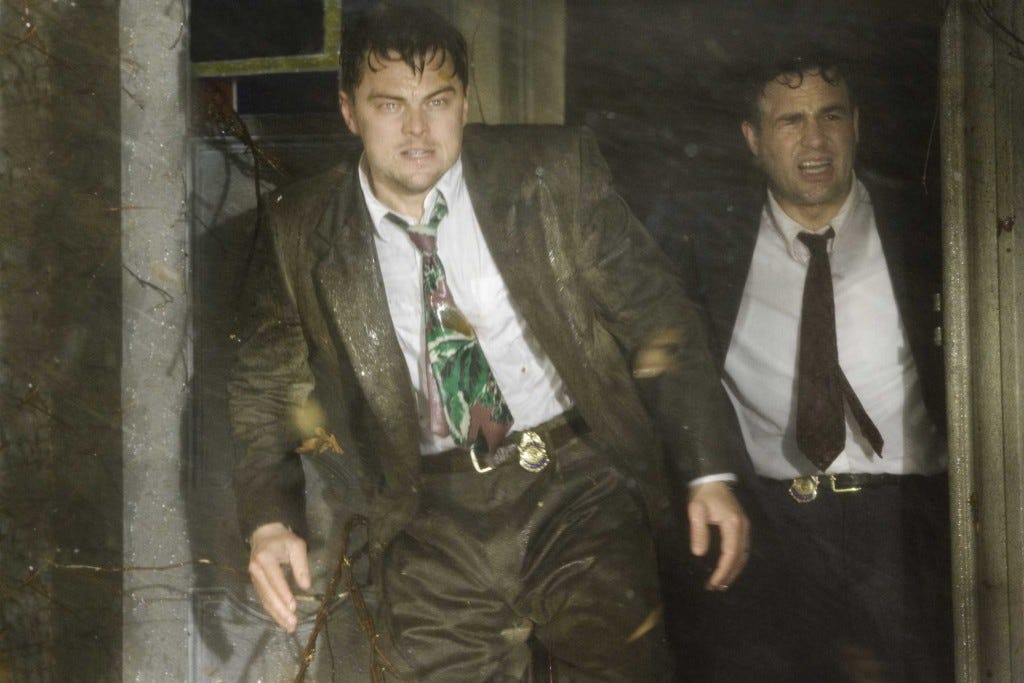Shutter Island

There's been much ado, at least from my little circle of friends and film critics, about why Martin Scorsese's latest, "Shutter Island" was moved from October, more or less prime Oscar contender season, to February, the barren wasteland on Hollywood's calendar.
We gossiped like bored housewives speculating why. The official reason was that star Leonardo DiCaprio was unavailable to do the press rounds because he was filming Christopher Nolan's "Inception," but it all sounded like hogwash to me.
No, we were bracing for a disaster on the level Scorsese hasn't seen since "Bringing Out the Dead" came and went more than 10 years ago.
After seeing it, I'm still not sure. It's certainly a lesser effort from Scorsese, whose last big film ("The Departed") finally netted him his long-elusive Oscar (snaring Best Picture to boot), but as pedestrian mindbending period thrillers go, this one's pretty good.
DiCaprio plays Teddy Daniels, a federal marshal who comes to the place called Shutter Island, a mysterious chunk of land that houses an institution for the criminally insane, where a woman has disappeared without a trace. According to the orderlies, she was locked in her room, but a few hours later she was gone, presumably having escaped past a dozen or more guards who should have seen her.
Teddy investigates, but is haunted by his own past, which includes losing his wife (Michelle Williams) in a fire, and his own internal trauma surrounding is World War II experiences (his platoon liberated the Dachau concentration camp).
Teddy, along with his partner Chuck (Mark Ruffalo) find a bit of interference from the intitution's leader (Ben Kingsley), and soon they find things are hardly as they seem.
It's difficult to say much more without introducing major spoilers, so I'll start off by saying there's a definite twist to the film (a couple, actually), and that the twist isn't particularly surprising or difficult to guess. To say it's telegraphed doesn't even properly describe how easy it was to guess what was going on.
And the getting there is at times pretty ponderous. Teddy spends much of the time casting accusatory glares at people who we just know are holding something back, and as things start to get crazier on Shutter Island we're more and more sure of what's going on.
But there are a few items of note that really save the film. First is the final scene, where a character makes a surprising final decision. It's really the movie's one big surprise.
The other is a curious choice on Scorsese's part (and on the part of Scorsese's longtime editor Thelma Schoonmaker) to sprinkle continuity errors throughout the film. They're rampant in the film from the first scene, where Mark Ruffalo's hands change position from one shot to the next, dialog is clipped and sounds unnatural, and in one scene a character touches DiCaprio's face, then there's a cut and the hands are suddenly on his shoulders.
I won't say any more, but it's done intentionally, for effect, rather than by accident (and note this is one of few filmmakers you can be sure that one could say with confidence this was done on purpose).
"Shutter Island" is based on a novel by Dennis Lehane, whose novels "Mystic River" and Gone Baby Gone" have also been adapted into films in recent years, and I dare say this is the weakest of those three titles. That's not necessarily something to be ashamed of, and that doesn't mean it's a bad film either.
It's a lesser effort from the man who has to battle his own reputation with each film, but even a weaker Scorsese film is still better than most of what's out there, especially in cold month of February.
You can read Christopher Lloyd's review here.


